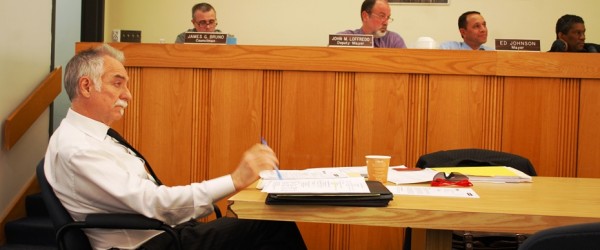Final infrastructure finance vote tomorrow night
Residents may comment, ask questions
The city council will vote at its meeting tomorrow night on whether to implement a new funding mechanism for infrastructure repairs in the waterfront redevelopment area.
At a council meeting held last week, many residents came to the microphone during public comment to ask about the plan.
Under the funding plan, the city will bond approximately $58 million over time on behalf of waterfront redeveloper Asbury Partners to fund infrastructure improvements in the waterfront redevelopment area.
The loan will be repaid over 30 years by new residents in waterfront area properties developed by Asbury Partners. The city will institute a payment in lieu of taxes [PILOT] agreement with a special assessment for new homeowners to pay down the loan.
New residents will pay the same total amount for property taxes as the rest of the city’s residents do, but their payment will be broken up differently. City residents pay taxes toward the city, the school district and the county.
New residents subject to the PILOT program will pay the same total amount of property taxes, but their money will be divided differently, into three parts. They will pay the same amount of property taxes to the city as other homeowners do. Five percent of their total bill will benefit the county. The remainder of their payment will pay down the infrastructure loan. The school district will not receive any property tax payments from the new developments over the next 30 years.
City council candidate John Moor said that of his current annual property tax payment, 16 percent benefits the county; 57 percent goes to the city; and 20 percent goes to the school. Knowing homes located in the waterfront redevelopment area will not contribute to the school’s tax coffers, Moor asked what will happen if the state tries to wean the school district off of the considerable state aid it receives each year.
City residents contribute about 27 percent of each tax bill to school aid while most municipalities contribute 50 to 60 percent to their schools, city manager Terence Reidy [pictured above, foreground] said. This is because of the state aid that benefits the school system in the city, which is classified as an Abbot district.
Projects like the waterfront redevelopment typically don’t lead to an influx of school-aged children, Reidy said. But the city does have the option to designate money from the PILOT agreement to the school district at a later date if it so chooses, he said.
Also, if the waterfront area was not being redeveloped, the city wouldn’t see nearly as much new tax revenue as it could under the new plan, Reidy said.
The infrastructure finance plan is necessary, Reidy said, because the current market does not enable a private developer to both develop new real estate and make extensive infrastructure repairs, Reidy said.
“If you leave that burden [of repairing infrastructure] to the developer and they say, ‘We’re not going to do it,’ then you have no redevelopment in the waterfront,” he said. “The key of this is coming up with a creative way to protect the city, let the city get the revenue it should get, and get the infrastructure rebuilt.”
City resident Bess McCarthy asked for details on the infrastructure bond itself, including who is taking out the loan and who guarantees it.
The city will issue the bond, Reidy said, but iStar Financial — the majority owner of Asbury Partners — guarantees the bond. This means that iStar is responsible for paying the bond if the PILOT plan and special assessment fail for an unforeseen reason.
Also, the bond will be issued in phases, Reidy said. The first phase will be a $2 million loan, and the rest will be dispersed as the infrastructure repairs are completed, he said.
“It will be an opportunity for us to monitor and make sure the city is protected,” Reidy said of the slow roll-out.
McCarthy also asked why the city uses one master redeveloper, as redeveloping an entire section of the city is a daunting task and allowing redevelopers to improve lots piecemeal — like in the central business district — is usually more effective.
“Nobody has enough money to develop the whole city,” she said. “They can’t.”
“You’re right about that,” Reidy said. But the city is bound by the agreement it made with Asbury Partners years ago.
“They purchased the redevelopment rights,” Reidy said. “That’s how we got to where we are today.”
City resident Calvin Anderson asked why FEMA [Federal Emergency Management Agency] money could not be used to redevelop. He also said the city was asking him to become an investor by making this deal.
“No, it’s not,” Reidy said. “The city is not investing any money into those bonds. Not a penny. That’s part of the misunderstanding. No tax dollars are going into this. We didn’t spend money on attorney fees the issuance of bonds, or anything.”
As for the FEMA funds, the city is still awaiting money for storm damage to the boardwalk and the sewer plant, Reidy said.
Duanne Small, a council candidate, asked if the city will include a clause in the agreement ensuring that 20 percent of workers used on infrastructure repairs are city residents. Many redevelopment and construction projects in the city are required to abide by such a rule.
In the infrastructure agreement, there is a “best efforts clause,” Reidy said. The clause asks only that developers try to use local workers and local supplies.
“We need a community benefits agreement that states a certain percentage of this [work] goes to the community,” Small said. “It has to be monitored and tracked.”
The council meeting tomorrow, Feb. 20, begins with a workshop session at 6 p.m. The regular meeting starts at 7 p.m. After public comment and some other agenda items, a public hearing on the infrastructure financing agreement will be held. Members of the public will be able to speak and ask questions.















